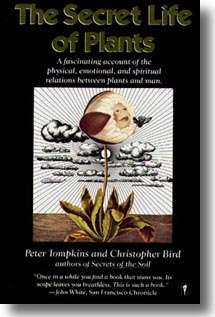The Secret Life of Plants
 The Secret Life of Plants cover | |
| Author | Peter Tompkins, Christopher Bird |
|---|---|
| Publisher | Harper & Row |
Publication date | 1973 |
| ISBN | 0-06-091587-0 |
| OCLC | 19751846 |
The Secret Life of Plants (1973) is a book by Peter Tompkins and Christopher Bird. The book documents controversial experiments that reveal unusual phenomena regarding plants such as plant sentience, discovered through experimentation. It goes on to discuss philosophies and progressive farming methods based on these findings. The book was heavily criticized by scientists for promoting absurd pseudoscientific claims.[1][2]
Authors
Christopher Bird was a best-selling author who also wrote The Divining Hand: The 500-Year-Old Mystery of Dowsing.[3] Peter Tompkins worked as a journalist, as well as a US military intelligence officer for the OSS in Italy during the Second World War[4]
Summary
The book includes summaries of the life and work of 20th century scientists Jagadish Chandra Bose and Corentin Louis Kervran as well as 19th century scientist George Washington Carver.
The book includes experiments on plant stimuli using a polygraph, a method which was pioneered by Cleve Backster.[5][6] Parts of the book attempt to disparage science, particularly plant biology, for example by claiming science is not concerned with "what makes plants live", in order to promote its own viewpoint that plants have emotions. The authors further say the authorities are unable to accept that emotional plants "might originate in a supramaterial world of cosmic beings which, as fairies, elves, gnomes, sylphs, and a host of other creatures, were a matter of direct vision and experience to clairvoyants among the Celts and other sensitives."[5]
Criticism
The book has been criticized by botanists such as Arthur Galston for endorsing pseudoscientific claims.[7] According to Galston and physiologist Clifford L. Slayman many of the claims in the book are false or unsupported by independent verification and replicable studies.[8]
Botanist Leslie Audus noted that the book is filled with nonsensical "outrageous" claims and should be regarded as fiction.[1]
Documentary
The book was the basis for the 1979 documentary of the same name,[9] directed by Walon Green and featuring a soundtrack by Stevie Wonder, later released as Journey through the Secret Life of Plants. The film made use of time-lapse photography (where plants are seen growing in a few seconds, creepers reach out to other plants and tug on them, mushrooms and flowers open).[10] The film was originally distributed by Paramount Pictures.
See also
References
- 1 2 Audus, Leslie. (1974). Roots of Absurdity. New Scientist. 17 October. p. 207
- ↑ Galston, Arthur. (1974). The Unscientific Method. Natural History 83: 18-24.
- ↑ "Christopher Bird, 68, a Best-Selling Author - New York Times". Nytimes.com. 1996-05-06. Retrieved 2011-10-24.
- ↑ Richard Harris Smith (1972). OSS: The Secret History of America's First Central Intelligence Agency. University of California Press. pp. 86–87. ISBN 978-0-520-02023-8.
- 1 2 Abelson, P. H. (21 June 1974). "Pseudoscience". Science. 184 (4143): 1233–1233. doi:10.1126/science.184.4143.1233.
- ↑ Terzian, Yervant (editor) (1998). Carl Sagan's universe (Repr. ed.). Cambridge: Cambridge University Press. ISBN 0-521-57286-X. External link in
|title=(help) - ↑ Galston, Arthur W. (1974). Commentary: The Unscientific Method. By Ignoring Accepted Rules of Evidence, the Authors of a Popularized Book on Plants Reach Many False Conclusions. BioScience 24 (7): 415-416.
- ↑ Galston, Arthur W; Slayman, Clifford L. (1979). The Not-so-secret Life of Plants: In Which the Historical and Experimental Myths About Emotional Communication Between Animal and Vegetable Are Put to Rest. American Scientist 67 (3): 337-344.
- ↑ The Secret Life of Plants video on YouTube
- ↑ The Secret Life of Plants at the Internet Movie Database
Further reading
- Galston, Arthur. (1974). The Unscientific Method. Natural History 83: 18-24.
- Mescher, Mark C; Moraes, Consuelo M. De. (2015). The Role of Plant Sensory Perception in Plant–Animal Interactions. Journal of Experimental Botany 66: 425-433.